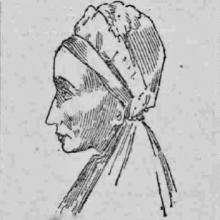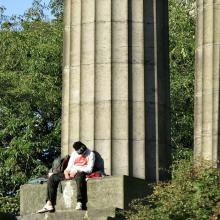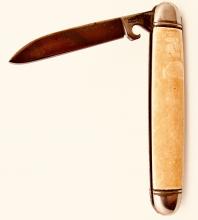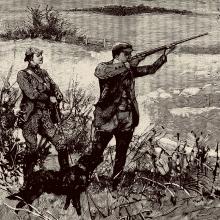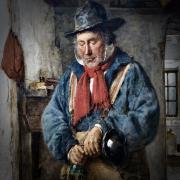
1877
SHEBEENING IN GREENSIDE ROW.
At the City Police Court, a man named John Buist, residing in Simpson’s Court, was charged with having trafficked in liquors in his house without having the necessary license.
—He pleaded guilty, and was fined £7, with the alternative of six weeks’ imprisonment.
Edinburgh Evening News, 12 February 1877
[Image: Erskine Nicol, ‘A Nip Against the Cold’, Wikipedia, creative commons.]
*****
WEST SCOTLAND STREET LANE.—Sheriff Davidson has dismissed a petition by the owners of certain heritable properties in West Scotland Street Lane calling upon the Edinburgh City Road Trust to put the carriageway of the lane in good repair.
His lordship found that the lane had never been assumed by that body, and had never been maintained by the Road Trust, and that therefore they are not bound to put the same into repair, or to maintain it.
In a note to the interlocutor the Sheriff says that the contention of petitioners was that when Scotland Street was assumed by the Trust the lane was also assumed, but they could state no circumstances from which it ought be inferred that it was so assumed, and no facts as to its repair by the trustees, while the minutes of the Trust did not show that it was assumed.
The petitioners were found liable in expenses.[1]
Edinburgh Evening News, 2 April 1877
[1] A decision was finally taken to adopt the lane in April 1878.
*****
ASSAULTING A WIFE AND SON.
At the City Police Court, Alexander Lane pleaded guilty to having yesterday, in his house in Gilchrist Lane, Greenside Row, behaved himself in a riotous and disorderly manner, assaulted his wife and son by striking them with his fists on various parts of the body. Having been previously convicted of a similar offence he was sent 21 days to prison.
Edinburgh Evening News, 25 April 1877
*****
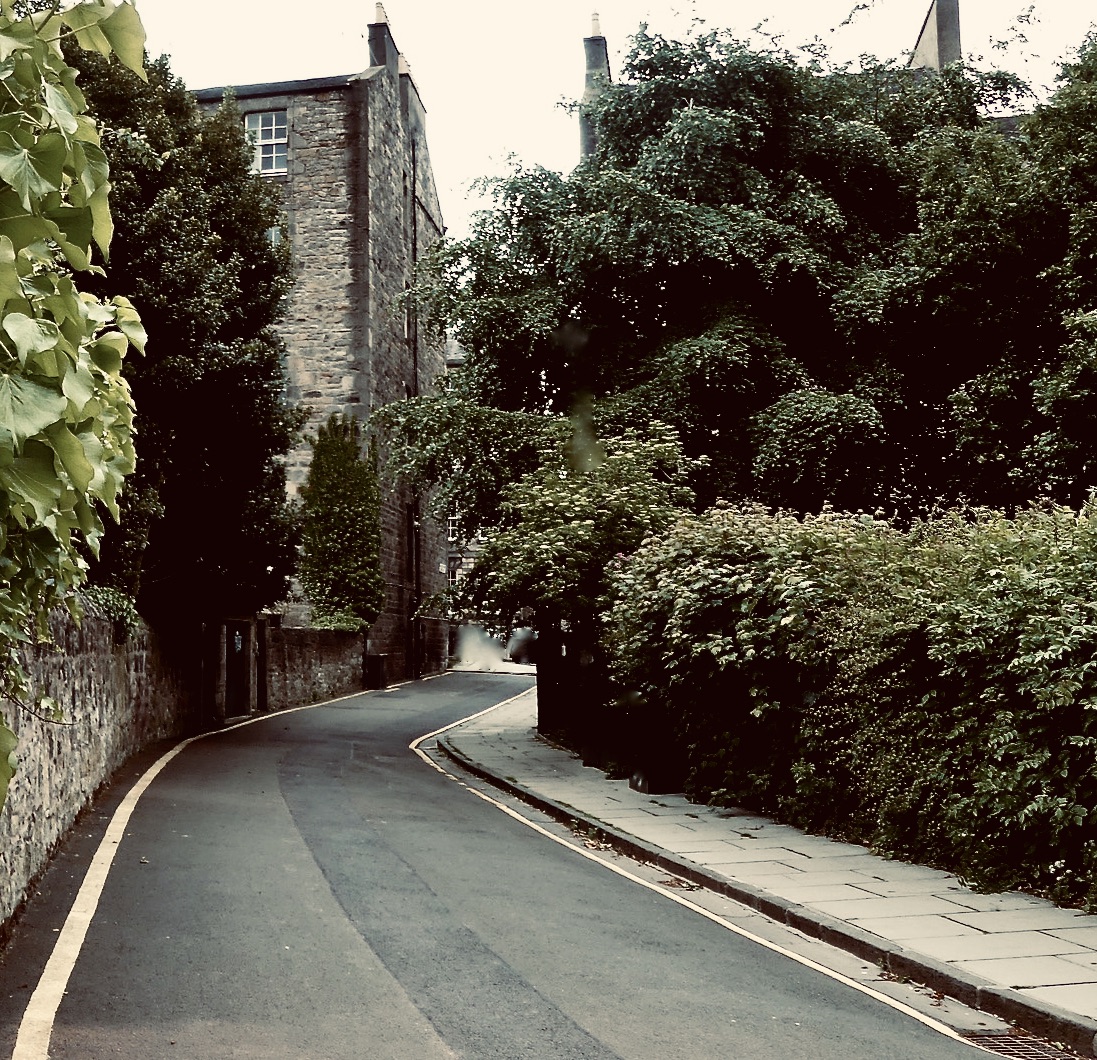
CONTRACTORS—
ESTIMATES are WANTED for forming a FOOT PAVEMENT on the North Side of SCOTLAND STREET LANE, according to Plan and Specification which may be seen at the Public Works Office, 11 Royal Exchange, on and after Thursday the 5th inst. The Estimates must be sent to the Superintendent of Works here, by 10 a.m. on Monday the 9th inst., sealed and marked “Tender for Footpath at Scotland Street Lane.” The Town Council do not bind themselves to accept the lowest or any offer.
11 Royal Exchange, 5th July 1877.
Scotsman, 5 July 1877
[Image: DM.]
*****
ALLEGED CRUEL TREAMENT OF CHILDREN
Last night a shoemaker named Bernard Timon was taken into custody by the Edinburgh police on a charge of cruelly ill-treating two of his children, aged seven and five years respectively.
Between eight and nine o’clock the neighbours reported loud screams proceeding from Timon’s house at No. 9 Queen’s Place, Greenside,[2] and on obtaining a policeman, who forced an entrance, the two children were found to be bleeding from several wounds on various parts of their bodies. They were so severely injured that they were unable to walk, and it was found necessary to have them conveyed to the infirmary, where they still remain.
The accused stated that he had merely been chastising the children for making away with one of his tools. The children, however, said that he was in the habit of ill-using them, and that last night he not only beat them with a heavy piece of wood, but threw them to the ceiling of the house and allowed them to fall heavily to the ground.
Timon, who has been a widower for several years, is a native of Ireland, and the other members of the family, who are grown up, reside in Armagh. He was brought up at the Police Court this morning, on a charge of behaving in a disorderly manner in his house last night, and with assaulting his two sons named Alexander and John to the effusion of blood.
On the application of Mr Superintendent Linton, the case was continued till to-morrow pending further inquiries.
Edinburgh Evening News, 19 July 1877
*****
THE ALLEGED CRUELTY TO CHILDREN.—At the Police Court yesterday, Bernard Timon, shoemaker, […] was remitted to the Sheriff on a charge of cruel and unnatural treatment to children of a tender age. […]
Later in the day Timon was taken before Sheriff Hamilton, when a certificate by Dr Littlejohn[3] was produced, bearing that the prisoner was insane, and dangerous to himself and the lieges.[4]
The Sheriff committed the accused to Morningside Asylum pending further inquiry.
Scotsman, 21 July 1877
[3] The Police Surgeon (see n.8, News from the Mews 12).
[4] ‘Lieges’—other people.
*****

THE TRAMWAY FARE QUESTION.
At the Small Debt Court yesterday afternoon, before, Sheriff Hallard, Mr A. Archibald, Gayfield Lane, Edinburgh, was summoned by the Edinburgh Tramways Company for 1d, being the balance of a twopenny fare which he refused to pay for travelling on one of the defenders’ cars between Gayfield Square and the Post Office.[5]
The company was represented by Mr D. Peterson, W.S., and Mr Wise appeared for the defender.
—lt was admitted that the distance was under one mile. Wise quoted the 38th section of the Act I871 and the 10th article of agreement appended thereto. He contended that by the one the company were apparently empowered to charge a sum of not exceeding 2d for any less distance than two miles, but that by the other they were restricted to a charge of 1d for each mile or a fraction of a mile. He maintained therefore that the company were bound to carry passengers a complete mile before they could enforce the charge of 2d. They had not, however, done so in this instance.
In construing the Act they must take the intention of the legislature into account, and undoubtedly, in the contract between the local authorities and the Tramway Company, it was meant that passengers should be carried at the rate of one penny per mile in covered carriages.
—Mr Paterson submitted that the company was entitled to charge twopence for any distance not exceeding two miles. The Act had been construed over and over again in favour this contention, and could not be correctly read in any other sense.
The Sheriff said there must be some reason for the agreement clause, and he believed it had been inserted because the usual distance people had to travel in Edinburgh was not more than two miles, and to prevent any question arising as to distance. It would have been extremely inconvenient to have passengers saying they had travelled less than a mile, and the company therefore got power to make a minimum charge of 2d.
He gave decree for the amount sued for, with half a guinea of expenses.—lt was arranged that another and similar case should be ruled by this decision.
Edinburgh Evening News, 16 August 1877
[5] Waterloo Place.
*****
ANNOYING NEIGHBOURS.
At the City Police Court, before Sheriff Hamilton, a man named James Brown and a woman named Jemina Brown pleaded guilty to having behaved in a riotous and disorderly manner in a house occupied by them in Cumberland Street Lane, to the annoyance and disturbance of their neighbours.
The man was sent to prison for ten days, and the woman was dismissed from the bar.[6]
Edinburgh Evening News, 23 November 1877
[6] Such behaviour was not unusual in Cumberland St Lanes. James and Jemima Burns (probably the same couple) pleaded guilty to the same charges in May the next year, and each having already 2 convictions for the offence they were jailed for 10 days. Charles Lorimer, Thomas Whitelaw, and Christina Lorimer pleaded guilty in October 1878, and were let off with an admonition.
*****
News from the Mews will resume in 1878 on Monday.
